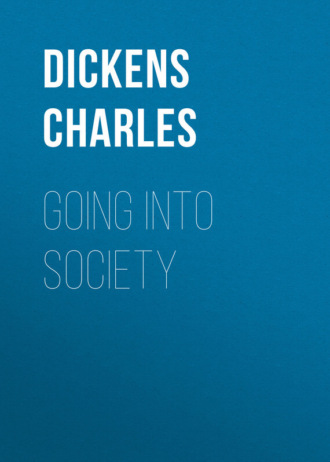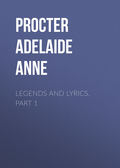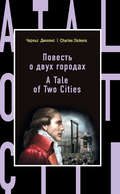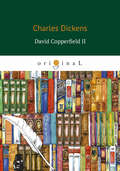
Чарльз Диккенс
Going into Society
Twelve thousand odd hundred pound, was Chops’s winnins. He had bought a half-ticket for the twenty-five thousand prize, and it had come up. The first use he made of his property, was, to offer to fight the Wild Indian for five hundred pound a side, him with a poisoned darnin-needle and the Indian with a club; but the Indian being in want of backers to that amount, it went no further.
Arter he had been mad for a week – in a state of mind, in short, in which, if I had let him sit on the organ for only two minutes, I believe he would have bust – but we kep the organ from him – Mr. Chops come round, and behaved liberal and beautiful to all. He then sent for a young man he knowed, as had a wery genteel appearance and was a Bonnet at a gaming-booth (most respectable brought up, father havin been imminent in the livery stable line but unfort’nate in a commercial crisis, through paintin a old gray, ginger-bay, and sellin him with a Pedigree), and Mr. Chops said to this Bonnet, who said his name was Normandy, which it wasn’t:
“Normandy, I’m a goin into Society. Will you go with me?”
Says Normandy: “Do I understand you, Mr. Chops, to hintimate that the ’ole of the expenses of that move will be borne by yourself?”
“Correct,” says Mr. Chops. “And you shall have a Princely allowance too.”
The Bonnet lifted Mr. Chops upon a chair, to shake hands with him, and replied in poetry, with his eyes seemingly full of tears:
“My boat is on the shore,
And my bark is on the sea,
And I do not ask for more,
But I’ll Go: – along with thee.”
They went into Society, in a chay and four grays with silk jackets. They took lodgings in Pall Mall, London, and they blazed away.
In consequence of a note that was brought to Bartlemy Fair in the autumn of next year by a servant, most wonderful got up in milk-white cords and tops, I cleaned myself and went to Pall Mall, one evening appinted. The gentlemen was at their wine arter dinner, and Mr. Chops’s eyes was more fixed in that Ed of his than I thought good for him. There was three of ’em (in company, I mean), and I knowed the third well. When last met, he had on a white Roman shirt, and a bishop’s mitre covered with leopard-skin, and played the clarionet all wrong, in a band at a Wild Beast Show.
This gent took on not to know me, and Mr. Chops said: “Gentlemen, this is a old friend of former days:” and Normandy looked at me through a eye-glass, and said, “Magsman, glad to see you!” – which I’ll take my oath he wasn’t. Mr. Chops, to git him convenient to the table, had his chair on a throne (much of the form of George the Fourth’s in the canvass), but he hardly appeared to me to be King there in any other pint of view, for his two gentlemen ordered about like Emperors. They was all dressed like May-Day – gorgeous! – And as to Wine, they swam in all sorts.
I made the round of the bottles, first separate (to say I had done it), and then mixed ’em all together (to say I had done it), and then tried two of ’em as half-and-half, and then t’other two. Altogether, I passed a pleasin evenin, but with a tendency to feel muddled, until I considered it good manners to get up and say, “Mr. Chops, the best of friends must part, I thank you for the wariety of foreign drains you have stood so ’ansome, I looks towards you in red wine, and I takes my leave.” Mr. Chops replied, “If you’ll just hitch me out of this over your right arm, Magsman, and carry me down-stairs, I’ll see you out.” I said I couldn’t think of such a thing, but he would have it, so I lifted him off his throne. He smelt strong of Maideary, and I couldn’t help thinking as I carried him down that it was like carrying a large bottle full of wine, with a rayther ugly stopper, a good deal out of proportion.
When I set him on the door-mat in the hall, he kep me close to him by holding on to my coat-collar, and he whispers:
“I ain’t ’appy, Magsman.”
“What’s on your mind, Mr. Chops?”
“They don’t use me well. They an’t grateful to me. They puts me on the mantel-piece when I won’t have in more Champagne-wine, and they locks me in the sideboard when I won’t give up my property.”
“Get rid of ’em, Mr. Chops.”
“I can’t. We’re in Society together, and what would Society say?”
“Come out of Society!” says I.
“I can’t. You don’t know what you’re talking about. When you have once gone into Society, you mustn’t come out of it.”
“Then if you’ll excuse the freedom, Mr. Chops,” were my remark, shaking my head grave, “I think it’s a pity you ever went in.”
Mr. Chops shook that deep Ed of his, to a surprisin extent, and slapped it half a dozen times with his hand, and with more Wice than I thought were in him. Then, he says, “You’re a good fellow, but you don’t understand. Good-night, go along. Magsman, the little man will now walk three times round the Cairawan, and retire behind the curtain.” The last I see of him on that occasion was his tryin, on the extremest werge of insensibility, to climb up the stairs, one by one, with his hands and knees. They’d have been much too steep for him, if he had been sober; but he wouldn’t be helped.






